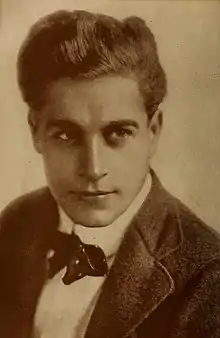Elmer Clifton | |
|---|---|
 Clifton in 1917 | |
| Born | Elmer Clifton Forsyth March 14, 1890 Toronto, Ontario, Canada |
| Died | October 15, 1949 (aged 59) Los Angeles, California, U.S. |
| Occupation(s) | Film director, screenwriter, actor |
| Years active | 1912–1949 |
| Spouse |
Helen Kiely (m. 1926) |
| Children | 3 |
Elmer Clifton Forsyth (March 14, 1890 – October 15, 1949) was an American director, screenwriter, and actor from the early silent days.
Early life
Elmer Clifton Forsyth was born in Toronto, Canada, to Cecil Carl Forsyth and Margaret Nicolle.
Career
A collaborator of D.W. Griffith, Clifton appeared in The Birth of a Nation (1915) and Intolerance (1916) before giving up acting in 1917 to concentrate on work behind the camera, with Griffith and Joseph Henabery as his mentors. His first feature-length solo effort as a director was The Flame of Youth with Jack Mulhall.
Clifton honed his talents during the late 1910s, directing vehicles for Mulhall and Herbert Rawlinson at Universal and then for Dorothy Gish for Famous Players–Lasky. Two of his projects with Gish, Nobody Home and Nugget Nell, featured performances from pre-stardom Rudolph Valentino. Most of this early output has been lost.[1] He was the first filmmaker to discover the talents of Clara Bow, whom he cast in Down to the Sea in Ships, released on March 4, 1923.[2] The independently produced film was well reviewed for its visual authenticity.
During the 1920s, Clifton directed films for several different studios. During the filming of The Warrens of Virginia (1924) for Fox Film Corporation, lead actress Martha Mansfield suffered a fatal accident from burns when her costume caught fire. Clifton directed The Wreck of the Hesperus (1927) for Cecil B. deMille's production company, and filmed on location in the Grand Canyon for The Bride of the Colorado. He also directed some Technicolor short films, including Manchu Love with an all-Asian cast.[3]
In the sound era, Clifton wrote and directed many poverty row Westerns and "exploitation" classics, among them the anti-marijuana polemic Assassin of Youth (1937). He also directed the vice films Gambling with Souls (1936), Slaves in Bondage (1937) and City of Missing Girls (1941), all of which portrayed addiction and white slavery to some degree.
His last film Not Wanted (1949), was finished by producer Ida Lupino after Clifton suffered a heart attack three days into filming and was unable to work anymore.[4] He died in 1949 of a cerebral hemorrhage shortly after the film's release.
Personal life
Clifton married actress Helen Kiely on November 29, 1926. The couple had three children: Actress Dorinda Clifton, a daughter named Patricia, and a son named Michael.
Selected filmography
Partial filmography
Actor
| Year | Title | Role | Notes |
|---|---|---|---|
| 1912 | An Assisted Elopement | Young Tom Richmond | |
| 1914 | John Barleycorn | Jack, 3rd period | |
| Martin Eden | Cub reporter | ||
| Burning Daylight: The Adventures of 'Burning Daylight' in Alaska | Charley Bates | ||
| 1915 | The Birth of a Nation | Phil – Stoneman's Elder Son | |
| Strathmore | Marc | ||
| The Fox Woman | Marashida | ||
| The Lily and the Rose | Allison Edwards | ||
| The Sable Lorcha | Clyde | ||
| 1916 | The Missing Links | Horace Gaylord | |
| Acquitted | Ned Fowler | ||
| The Little School Ma'am | Wilbur Howard | ||
| Intolerance | The Rhapsode | ||
| The Old Folks at Home | Steve Coburn | ||
| 1917 | Nina, the Flower Girl | Jimmie | |
| 1919 | The Fall of Babylon | The Rhapsode | (final film role) |
References
- ↑ Golden, Eve; Golden Images: 41 Essays on Silent Film Stars; Jefferson: McFarland & Co; p 40. Web August 17, 2012
- ↑ "Real life story of Clara Bow", in sixteen parts, by Louella Parsons, published by San Antonio light, May 15 – June 4, 1931
- ↑ Slide, Anthony; Silent Topics: Essays On Undocumented Areas Of Silent Film; Scarecrow Press; p. 37; Web August 17, 2012
- ↑ "Movie of the Week: "Outrage"". The New Yorker. October 9, 2014.